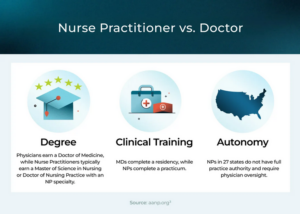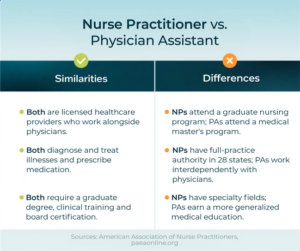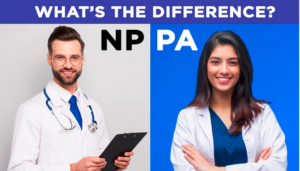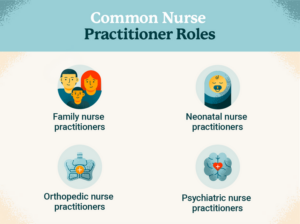Myths About Nurse Practitioners vs. Doctors
 When it comes to choosing between Nurse Practitioners vs Doctors, many patients find themselves unsure about which provider is right for their healthcare needs.
When it comes to choosing between Nurse Practitioners vs Doctors, many patients find themselves unsure about which provider is right for their healthcare needs.
Both Nurse Practitioners (NPs) and Doctors (MDs) are integral to the healthcare system, but there are key differences in their training, qualifications, and the care they provide.
Understanding these differences can help you make a more informed decision about your healthcare provider, especially when it comes to Primary Care Nurse Practitioners.
In recent years, Nurse Practitioners in Primary Care have become an increasingly popular choice for patients seeking personalized care and more immediate access to healthcare providers. This article will compare NP vs MD qualifications, training, scope of practice, and much more to help you decide whether a Nurse Practitioner or Doctor is best suited to your needs.

Struggling to meet your deadline?
Get your assignment on Myths About Nurse Practitioners vs. Doctors done by certified MDs and PhDs in the USA. ORDER NOW!
Are Nurse Practitioners Qualified for Primary Care?
One of the most common questions people ask when considering Nurse Practitioners vs Doctors is whether Nurse Practitioners are qualified for primary care. The answer is a resounding yes. Nurse Practitioners in Primary Care can diagnose, treat, and manage health conditions just like Doctors (MDs).
While there are differences in the training and educational paths that NPs and MDs follow, Primary Care Nurse Practitioners are more than equipped to handle the full range of primary care services. Nurse Practitioners are highly trained healthcare providers who are capable of conducting physical exams, diagnosing conditions, prescribing medications, and offering preventive care—essentially, they can perform many of the same tasks that doctors can, but with a unique nursing-focused approach. 
The question of whether Nurse Practitioners are as qualified as doctors often comes down to misconceptions. Nurse Practitioners’ education and training emphasize a patient-centered, holistic approach, which can lead to improved outcomes, particularly for chronic conditions and preventive care.
Common Myths About Nurse Practitioners
As Nurse Practitioners in healthcare continue to grow in popularity, several myths have emerged regarding their role in patient care. Below, we will address these misconceptions and clarify the truth behind the role of Nurse Practitioners.
Myth: Nurse Practitioners Are Inferior to Doctors
A common myth is that Nurse Practitioners are inferior to doctors or less qualified to provide medical care. In fact, Nurse Practitioners are highly trained professionals with advanced education and certifications. While Doctors attend medical school, Nurse Practitioners typically complete a Master’s or Doctorate in Nursing Practice (DNP), and they are board-certified after passing rigorous national exams.
In Primary Care Nurse Practitioners, the emphasis is placed on holistic patient care and preventive measures, which research shows can lead to better long-term outcomes for patients.
Myth: Nurse Practitioners Lack Independent Practice
Another myth is that Nurse Practitioners cannot practice independently. In reality, many states grant Full Practice Authority for Nurse Practitioners, which means that they can work autonomously, prescribe medications, and diagnose without the need for physician oversight. As of now, 27 states, including Alaska and Hawaii, grant Full Practice Authority for Nurse Practitioners. This number is steadily increasing, as the healthcare system recognizes the value of Nurse Practitioners in expanding access to care, especially in rural and under-served communities.
Myth: Nurse Practitioners Can’t Treat Chronic Conditions
Some people believe that Nurse Practitioners cannot treat chronic conditions such as diabetes, hypertension, or asthma. This is far from the truth. Nurse Practitioners are highly capable of diagnosing, managing, and treating chronic conditions. In fact, many Family Nurse Practitioners specialize in managing chronic diseases and providing ongoing care, counseling, and patient education.
Myth: Doctors Offer Superior Care Compared to Nurse Practitioners
The myth that Doctors provide superior care compared to Nurse Practitioners overlooks the important factors that determine the quality of care: provider-patient relationships, communication, and the personalized approach to care. Studies comparing the quality of care delivered by Nurse Practitioners and physicians consistently show minimal differences in patient outcomes. Nurse Practitioners often have longer appointment times, which can result in more thorough care, better patient education, and higher satisfaction levels.
The Role of Nurse Practitioners in Healthcare
Nurse Practitioners play a vital role in the healthcare system, particularly in Primary Care settings. As the demand for healthcare increases, Nurse Practitioners in healthcare are stepping up to provide essential services. They work alongside Doctors to ensure that patients receive high-quality, comprehensive care.
Nurse Practitioners can perform the following tasks:
- Diagnose and treat illnesses
- Prescribe medications
- Order and interpret diagnostic tests
- Provide preventive care and health screenings
- Educate patients about lifestyle changes and chronic disease management
Nurse Practitioners also focus heavily on preventive care, which can help reduce the need for costly interventions and hospitalizations in the future. Many patients appreciate the opportunity to work with Primary Care Nurse Practitioners, as they offer a holistic approach that includes both physical and mental well-being.
Understanding the Education and Training of Nurse Practitioners
The education and training of Nurse Practitioners differ significantly from that of Doctors. Understanding these differences can help you better appreciate the qualifications of Nurse Practitioners and their role in primary care.
Nurse Practitioners’ Education and Training
To become a Nurse Practitioner, one must first obtain a Bachelor of Science in Nursing (BSN) and become a licensed Registered Nurse (RN). After gaining several years of clinical experience, aspiring Nurse Practitioners pursue advanced degrees, such as a Master of Science in Nursing (MSN) or a Doctor of Nursing Practice (DNP). Nurse Practitioners are required to complete a minimum of 500 clinical hours in their area of specialization.
The education of Nurse Practitioners is rooted in the nursing model, which emphasizes a holistic approach to care. Nurse Practitioners are trained to consider not just the physical aspects of health, but also the psychological, social, and environmental factors that impact a patient’s overall well-being.
Doctors’ Education and Training
Becoming a Doctor requires a different educational path. Doctors first complete a bachelor’s degree in a scientific field, such as biology or chemistry, and then attend medical school for four years. After graduating from medical school, doctors enter a residency program, where they receive specialized training in their chosen field (family medicine, cardiology, pediatrics, etc.). The residency program typically lasts between 3 and 7 years, depending on the specialty.
While the medical model of care focuses more on diagnosing and treating diseases, Nurse Practitioners emphasize prevention, patient education, and a patient-centered approach to care. Both paths are rigorous, but they lead to different approaches in the way care is delivered.
Myth vs. Reality: Nurse Practitioners Are Just as Qualified as Doctors
Despite the myths, Nurse Practitioners are just as qualified as Doctors in many healthcare settings, particularly in primary care. In fact, Nurse Practitioners in Primary Care are often praised for their comprehensive, holistic approach to care, which includes preventive services, patient education, and emotional support.
Numerous studies have compared the quality of care provided by Nurse Practitioners and physicians, showing that NPs can provide the same level of care, especially in primary care settings. The key to successful healthcare is the relationship between the provider and the patient, and Nurse Practitioners are known for their strong communication skills, ability to build trust, and focus on long-term patient well-being.
Nurse Practitioners’ Role in Specialties (e.g., Pediatrics, Cardiology, Women’s Health)
While Nurse Practitioners are often associated with primary care, they also specialize in many other areas of medicine. Some of the common specialties for Nurse Practitioners include Pediatrics, Cardiology, and Women’s Health.
- Pediatric Nurse Practitioners (PNPs) focus on the health of children and can provide routine care, vaccinations, and manage common illnesses.
- Cardiac Nurse Practitioners (CNPs) specialize in cardiology and work alongside cardiologists to manage heart-related conditions such as hypertension, heart disease, and arrhythmias.
- Women’s Health Nurse Practitioners (WHNPs) provide care for women’s reproductive health, offering services such as family planning, pregnancy care, and menopause management.
Why Some Patients Prefer Nurse Practitioners for Primary Care
Many patients prefer to see Nurse Practitioners for primary care for several reasons:
- Personalized Care: Nurse Practitioners typically spend more time with patients, ensuring that they understand their health conditions and treatment options. Patients appreciate the thorough explanations and the individualized care they receive.
- Shorter Wait Times: In many healthcare systems, Nurse Practitioners can offer shorter wait times compared to Doctors, which means patients can get the care they need more quickly.
- Preventive Focus: Nurse Practitioners emphasize preventive care, helping patients manage risk factors and avoid serious health conditions before they arise.
- Holistic Approach: Many patients are drawn to Nurse Practitioners because of their holistic approach to care, which considers all aspects of a patient’s well-being—physical, emotional, and mental.
States with Full Practice Authority for Nurse Practitioners
One of the key differences between Nurse Practitioners and Doctors is the legal scope of practice. In some states, Nurse Practitioners have Full Practice Authority, which means they can practice independently without the need for physician oversight. As of now, 27 states grant Full Practice Authority for Nurse Practitioners, allowing them to diagnose, treat, and prescribe medications without restrictions. These states recognize the value that Nurse Practitioners bring to the healthcare system by expanding access to care, particularly in under-served areas.
Choosing the Right Primary Care Provider: NP vs. Doctor
The decision of whether to choose a Nurse Practitioner or a Doctor for primary care depends largely on personal preference. Some people prefer the expertise and extensive training of a Doctor, while others may feel more comfortable with the patient-centered approach of a Nurse Practitioner. Both have their strengths and can offer high-quality care.
The Bottom Line: Should You Choose a Nurse Practitioner or Doctor for Primary Care?
When deciding between a Nurse Practitioner and a Doctor for primary care, it’s important to consider your healthcare needs, the relationship you want to have with your provider, and your priorities when it comes to care.
In general, Nurse Practitioners offer a more personalized approach, spend more time with patients, and emphasize preventive care, making them an excellent choice for many people seeking primary care services. However, if you need more specialized care or are seeking a physician’s expertise in a specific area, a Doctor may be the better choice.
Ultimately, the quality of care you receive will depend on your relationship with your healthcare provider. Whether you choose a Nurse Practitioner or a Doctor, it’s essential to feel comfortable with your provider and trust their expertise in meeting your healthcare needs.
By understanding the unique qualifications and benefits of Nurse Practitioners and Doctors, you can make a more informed choice about your primary care provider, and take steps toward better health and well-being.

Dont wait until the last minute.
Provide your requirements and let our native nursing writers deliver your assignments ASAP.